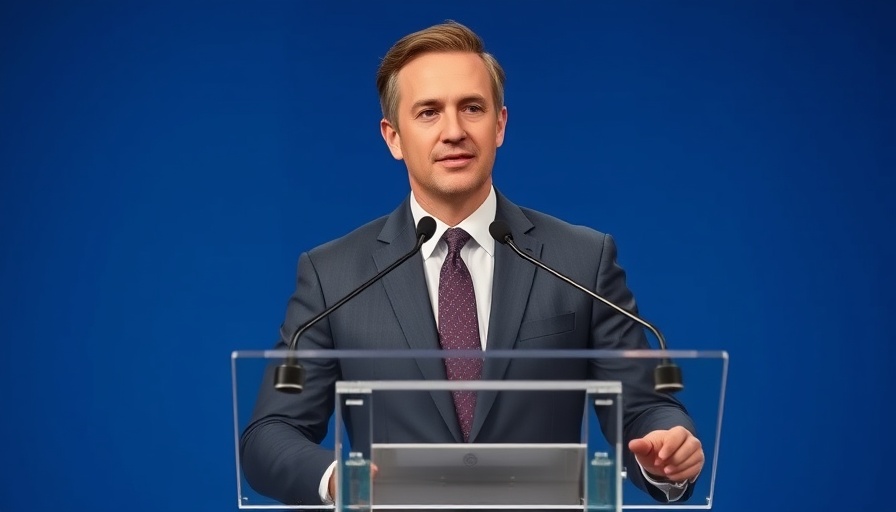
The Revitalization of South Africa's Nuclear Ambitions
Minister Kgosientsho Ramokgopa is charting a new course for South Africa's nuclear energy landscape. Speaking at the G20 Energy Transitions working group meeting in Cape Town, Ramokgopa announced efforts to reignite the nation’s nuclear build programme, expressing a sense of urgency about integrating nuclear power into the country’s energy matrix. With a global trend towards adopting nuclear energy to foster green transitions, South Africa stands at a crossroads between energy reliance and innovation.
Nuclear Energy: A Path Forward for South Africa
The proposed initiative comes amidst growing acknowledgment of the necessity for diversified energy production methods. Ramokgopa indicated that while there is widespread consensus about the need for nuclear energy, the complexities surrounding its financial feasibility remain a major obstacle. “The core question is one of affordability and the financial muscle to pay for the upfront capital costs,” he pointed out, emphasizing how expert advice from the International Atomic Energy Agency could guide the nation in navigating these challenges.
Funding the Nuclear Revival: A Pragmatic Approach
Funding remains a crucial barrier to the revival of the nuclear programme, with estimates for the required financial infusion standing at approximately R60 billion. The minister has made it clear that such sums are unlikely to derive from national fiscal allocations, compelling the government to explore alternative funding avenues. “We have had discussions with entities in China and the US who are eager to invest in our nuclear future,” Ramokgopa noted, hinting at a new era of international cooperation.
Global Trends in Energy: The Growing Role of Nuclear
The dialogue around energy transition cannot ignore the emphasis placed on nuclear power in various countries seeking greener solutions. From advanced economies to emerging markets, the global trend shows a collective pivot towards sustaining nuclear power as an integral part of future energy frameworks. This context positions South Africa strategically, potentially reviving its status as a leader in the African energy landscape.
The Implications of Nuclear Energy for South Africa's Economic Recovery
Investing in nuclear energy could send positive ripples through numerous sectors within the South African economy. From diminishing the chronic load shedding that has plagued daily life and economic function to potentially enhancing job creation in new energy sectors, the stakes are high. As the country grapples with unemployment rates and the ramifications of the COVID-19 pandemic, a rejuvenation in nuclear energy could catalyze broader economic recovery.
Counterarguments: The Risks and Concerns
Despite the promising outlook, numerous concerns linger regarding nuclear energy. Critics cite the long construction times, potential environmental impacts, and the shadow of past controversies surrounding nuclear safety. The South African government must communicate effectively about how these concerns will be addressed to garner public trust and support.
Insights on Collaboration Within South Africa's Energy Sector
As the country explores the revitalization of its nuclear options, collaboration between the government, private investors, and international entities becomes essential. This cooperative model can lead to innovative financing solutions while drawing on global best practices in nuclear technology and energy management. Moreover, fostering partnerships with various stakeholders can enhance transparency, thereby addressing public fears related to nuclear safety.
Concluding Thoughts: The Path Ahead for the Nuclear Programme
Ultimately, South Africa's journey toward re-establishing a robust nuclear energy programme is one fraught with challenges yet laden with opportunities. With the right funding, expertise, and stakeholder engagement, the nation could emerge stronger and more resilient in its energy capabilities, with profound effects on its political and economic landscape.
As professionals interested in the intersections of energy policy and economic strategy, stakeholders must stay engaged and informed about these developments in South African politics and energy policy. The future of nuclear energy in South Africa could be pivotal, offering insights into the broader implications for governance and sustainable development.
If you're interested in how governmental initiatives could shape the future landscape of energy and economic recovery in South Africa, consider contributing to discussions on energy policy and governance.
 Add Row
Add Row  Add
Add 




Write A Comment